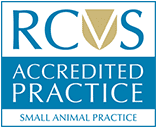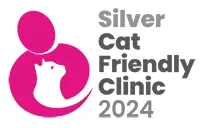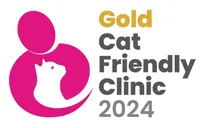Fireworks are enjoyed year round by many people, but can be a source of fear for our pets.
If your pet doesn’t enjoy the fireworks then please speak to us for help and advice as there are many things that can be done to help, ignoring the problem unfortunately doesn’t work.
You can also follow our top tips to make firework celebrations less frightening for your pet. If you are wondering whether your pet is having trouble coping with loud noises, check this list of symptoms below.
DOES MY PET HAVE A FEAR OF FIREWORKS?
- Trembling and shaking
- Clinging to you
- In case of dogs – barking excessively
- Cowering and hiding behind furniture
- Trying to run away
- Soiling in the house
- Pacing and panting
- Refusing to eat
- In the case of cats – seeking high hiding places
It is possible to assess your dog’s fear of fireworks by following the link to their fireworks page https://www.adaptil.com/uk
TOP TIPS:
- Always make sure that your pets’ have somewhere to hide if they want to, and ensure that they have access to this place at all times, (for example, this could be under some furniture or in a cupboard or you could build them a den).
- During firework season, walk dogs during daylight hours and keep cats indoors when fireworks are likely to be set off.
- If your pet shows any signs of fear, try to ignore the behaviour. Leave them alone unless they are likely to harm themselves. Showing them more attention than you would do normally can inadvertently reinforce the behaviour even though you are just trying to reassure them.
- Never punish or fuss over your pet when its scared, as this will only make things worse in the long run. It’s best to just carry on as you would if the fireworks were not being set off.
- Make sure your cat or dog is always kept in a safe and secure environment and can’t escape if there is a sudden noise.
- Have your pet microchipped in case they do escape
- Plan ahead and talk to use about the use of naturally calming products available to help.
JUST FOR DOGS - BEFORE THE FIREWORK SEASON STARTS
Planning ahead can help your dog cope with the firework season.
PHEROMONE DIFFUSERS:
These disperse calming pheromones (chemical messengers) into the room, and may be a good option for your dog. Install a pheromone diffuser in your home preferably close to your dog’s hiding place. The pheromone diffused is a synthetic analogue of the dog-appeasing pheromone recommended for the control and management of fear and stress related disorders.
It produces a smell that only dogs can detect, that is replicated from a scent a mother dog produces to calm her puppies . It has been suggested that it works by changing the perception of the environment, rather than suppressing the fearful behaviour and so rapidly helps to calm the emotional behaviour without your dog being conscious of the change. it is not possible for your dog to overdose on the pheromones, or to become desensitised to them.
NUTRITIONAL SUPPORT PRODUCTS:
We have a range of nutritional support products which can be used to increase the amount of naturally occurring calming chemicals in your dog’s brain.
NATURAL DE-STRESSING AND PET CALMING SPRAYS :
We stock a supply of products which work help calm your pet using herbal compounds.
MEDICATION:
In some cases we recommend medication. All of these options should be used in conjunction with behavioural therapy, in the long term your pet needs to learn to be less afraid of loud noises. With proper treatment this is possible, so that the next firework season will be less stressful for you and your pet.
We may advise referral to a clinical animal behaviourist, or advise the use of sounds scary! CD therapy pack , which is an easy to follow CD therapy pack for dogs – it includes two CDs, an information booklet and an easy to follow guide. The amount of training needed will vary from dog to dog, so we recommend that you start training with sounds scary! Well in advance of firework season.
Before the firework season starts provide your dog with a doggy safe haven, or a play
room. This should be a quiet area so choose one of the quietest rooms in your home, it should be a place where your pet feels it is in control, so don’t interact with your pet when it’s in that area. Train your dog to associate the area with positive experiences e.g. by leaving toys there but not imposing yourself at any time.
Use a variety of toys and swap them regularly, putting them away when not in use so that your dog doesn ‘t become bored with them. With time your dog can learn that this place is safe and enjoyable, so when fireworks happen it may choose to go to its doggy den because it knows that when it’s there no harm will come to it, and so it’s more able to cope. It is important that your dog has access to its doggy den at all times – even if you are not at home.
JUST FOR CATS – BEFORE THE FIREWORK SEASON STARTS
Planning ahead can help your dog cope with the firework season.
PHEROMONE DIFFUSERS:
These disperse calming chemicals into the room, and may be a good option for your cat. Install a pheromone diffuser in your home preferably close to your cat’s hiding place. The pheromone diffused is a synthetic analogue of the feline facial pheromone recommended for the control and management of fear and stress related disorders.
It produces a smell that only cats can detect which is replicated from a scent that your cat produces when it rubs its face on areas and people it feels are safe. It has been suggested that it works by changing the perception of the environment, rather than suppressing the fearful behaviour and so rapidly helps to calm the emotional behaviour without the animal being conscious of the change.
NUTRITIONAL SUPPORT PRODUCTS:
We have a range of nutritional support products which can be used to increase the amount of naturally occurring calming chemicals in your cat ‘s brain.
NATURAL DE-STRESSING AND PET CALMING SPRAYS:
we stock a supply of products which work help calm your pet using herbal compounds.
MEDICATION:
In some cases we recommend medication. All of these options should be used in conjunction with behavioural therapy, in the long term your pet needs to learn to be less afraid of loud noises. With proper treatment this is possible, so that the next firework season will be less stressful for you and your pet.
We may advise referral to a clinical animal behaviourist.
Before the firework season starts provide your cat with a safe haven. This should be a quiet area so choose one of the quietest rooms in your home, it should be a place where your pet feels it is in control so don’t interact with your pet when it’s in that area.
Cats often feel safe when high up – and when in small spaces, so if possible provide them with the option of sleeping at different levels and provide them with a cardboard box, or enclosed bed for them to curl up in. With time your cat can learn that this place is safe and enjoyable so when fireworks happen it may choose to go to its safe haven because it knows that when it’s there no harm will come to it, and as a result be more able to cope. It is important that your cat has access to its safe haven at all times – even if you are not at home.
WHEN THE FIREWORKS START:
- Close any windows
- Black out the safe haven to remove any extra problems caused by flashing lights
- Ignore the firework noises yourself.
- Put the tv or radio on – but make sure they are not broadcasting fireworks!
JUST FOR DOGS:
Each evening before the fireworks begin, move your dog to its doggy safe haven and provide toys and other things that they may enjoy. Make sure that there are things for you to do too, so your dog isn’t left alone. Play with your dog if it wants to, but don’t force it to play if it doesn’t want to.
If you know a dog that isn’t scared by noises, and which gets on well with your dog then keeping the two together during the evenings may help your dog realise that there is no need to be afraid.
JUST FOR CATS:
Allow your cat to go to its safe haven if it wants to, do not try to tempt your cat out, as this will cause it to become more stressed.
We are here to help, so please come and talk to us before the fireworks start. You can pop into the surgery or phone us on 01942 417800.





